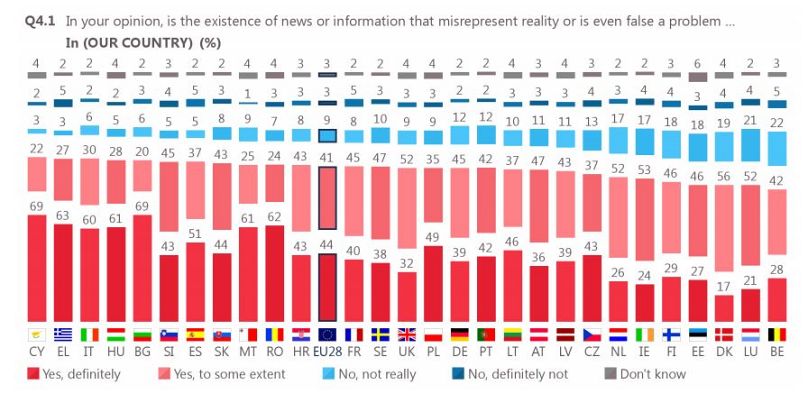A survey of over 26,500 people in Europe finds widespread awareness of fake news online and a relatively high level of trust in traditional media over social networks and video hosting websites.
More than four-fifths of people across the European Union perceive fake news on the internet to be a problem in their country and for democracy, according to research published by the European Commission.
 ADVERTISEMENT
ADVERTISEMENT
 ADVERTISEMENT
ADVERTISEMENT
In all 28 EU countries, at least seven out of ten people regard news or information which is either false or misrepresents reality to be such a problem, the research finds.
The survey of more than 26,500 people was carried out by phone by TNS Political and Social early in February.
‘High awareness’ of fake news
Almost four in ten respondents (37 percent) say they come across fake news almost every day – while at least half of those in all 28 EU countries say they do so at least once a week. More than seven out of ten (71 percent) say they feel confident in identifying the phenomenon.
Fake news is identified more often online than by traditional media users – and more so by people who left education late, compared to those with a relatively low level of education. This last group is more likely to say they come across fake news seldom or never, and less inclined to trust online and printed newspapers and magazines.
Overall, 85 percent of respondents believe fake news to be a problem in their country, with almost as many (83 percent) perceiving false or misrepresentative information as a problem for democracy.
Asked who should do most to stop the spread of fake news, respondents cited journalists, national authorities and broadcasting management as the three main groups, followed by citizens and online social networks.
Fake news: a problem in your country?
Traditional media ‘more trustworthy’
Traditional media – radio and television, as well as newspapers and magazines both in printed version and online – are perceived as a more trustworthy source of news compared to video hosting websites and podcasts, and online social networks and messaging apps.
However, the survey finds that younger respondents (15 to 24- year-olds) are more likely to trust news and information they access online.
Across the EU, radio listeners and television viewers display a relatively high level of trust in the news and information broadcast. At least half of respondents trust the content in printed newspapers and news magazines.
The survey finds a large discrepancy in attitudes towards video hosting websites and podcasts. People in Germany and Hungary are least likely to trust information on these platforms (20 percent), compared to over 60 percent in both Portugal and Lithuania.
Fewer than 20 percent of people in Italy, Germany and Austria trust news on online social networks and messaging apps, while in Romania the figure is three times higher – nearly 60 percent.
In January, a global study of attitudes by the communications marketing firm Edelman found that fear of fake news had shaken confidence in social media especially. A majority of people (59 percent) said it was getting harder to tell if a piece of news was produced by a respected media organisation, according to the survey of 33,000 people.
Amid dramatic shifts in opinion within individual countries, the study found that trust in institutions had declined sharply in the United States in particular.











